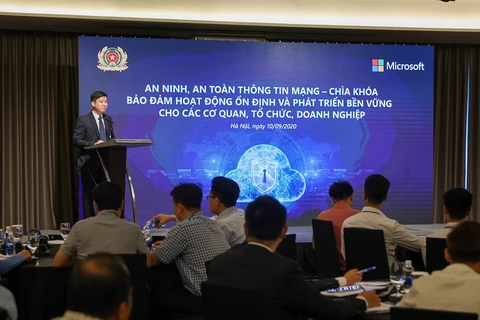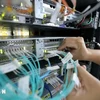 On June 3, Hung Yen province's police announced they had busted a gang in Yen My district, with members between 20-40 years old, who ran an online gambling and football betting ring from early 2021 on platforms like Facebook, Zalo, SMS and the website Bmg8899.net. (Photo: VNA)
On June 3, Hung Yen province's police announced they had busted a gang in Yen My district, with members between 20-40 years old, who ran an online gambling and football betting ring from early 2021 on platforms like Facebook, Zalo, SMS and the website Bmg8899.net. (Photo: VNA) Vietnam News Agency reported that the number of hi-tech crimes has increased in recent years. During the COVID-19 pandemic, when social distancing is applied in many areas and more people work from home, this type of crime has been more active, especially in gambling, fraud and property appropriation.
The Ministry of Public Security is acting fast to fight cyber security crimes, using high technology themselves.
Local divisions of cybersecurity and high-tech crime prevention and control have been established in many provinces and cities to step up that effort. Although many divisions are newly established, they have seen positive results.
The Division of Cyber Security and High-Tech Crime Prevention and Control in the central province of Quang Nam has recently cracked down on an illegal ring of online gamblers in the form of online football betting. This was the first victory of the division after only two days of establishment.
Captain Nguyen Trung Duc, deputy head of economic security department, Phu Tho province’s police, who cracked down on trillion-dong online gambling case of Phan Sao Nam and Nguyen Van Duong in 2018, said: “The key to combating cybercrimes is to collect online evidence. By understanding how criminals commit the crime, it is possible to collect evidence and fight effectively.
“In the modern age of technology, the methods and tricks of the criminals are unpredictable. The work pressure is so much heavier.
"Meanwhile, the masterminds and leaders who use high technology to commit crimes are all knowledgeable about informatics and always look for ways to eradicate evidence. Finding clues is extremely difficult.”
Major General Nguyen Minh Chinh, director of the Department of Cybersecurity and High-Tech Crime Prevention under Ministry of Public Security, said the cyber security situation has seen many new and more complicated developments that threaten information security around the world, especially in the ASEAN region. ASEAN’s high percentage of internet users (about 75 per cent of the population, equivalent to 480 million people) is being targeted by cyber attacks.
Cybercriminals with multiple purposes are also targeting critical information infrastructures of government agencies, businesses, organisations and people. New methods and tricks appeared in cyberattacks, thoroughly exploiting security holes of online meeting applications, spreading malicious codes, causing many serious consequences, he said.
According to the public security ministry, in 2020, more than 400 pages of State agencies out of more than 5,000 websites and portals in Vietnam were hacked. Cybercriminals also committed transnational law violations to defraud and appropriate properties. The main trick is to impersonate law enforcement agencies to commit fraud online, by phone or through multi-level business methods.
Major General Chinh said the ministry had sped up co-operation with law enforcement agencies of ASEAN countries and many other countries around the world to investigate, verify and handle many cases related to the use of drugs and high technology.
However, Vietnam and a number of ASEAN countries are lacking a legal framework in cybersecurity and have not kept pace with the rapid changes of the world’s cyberspace, he said.
“Cybercrime is becoming more sophisticated and complex. At ASEAN regional level, there is still no common legal document governing cooperation,” he said.
Some ASEAN countries have focused on building their own laws. But each country's legal opinion still has certain differences. Being behind with technology is also a barrier, he said.
The Vietnamese Ministry of Public Security has developed a comprehensive plan to raise awareness and capacity of all relevant stakeholders in cybersecurity. The Ministry of Public Security believes that, in addition to the efforts of police, it is necessary to further promote public-private cooperation between law enforcement agencies on cybersecurity and technology corporations. State management agencies need to strengthen dialogue and update cybersecurity policies for the business community, he said./.
VNA
























